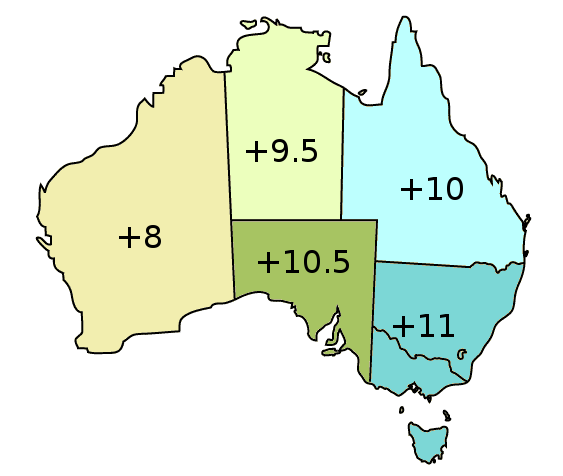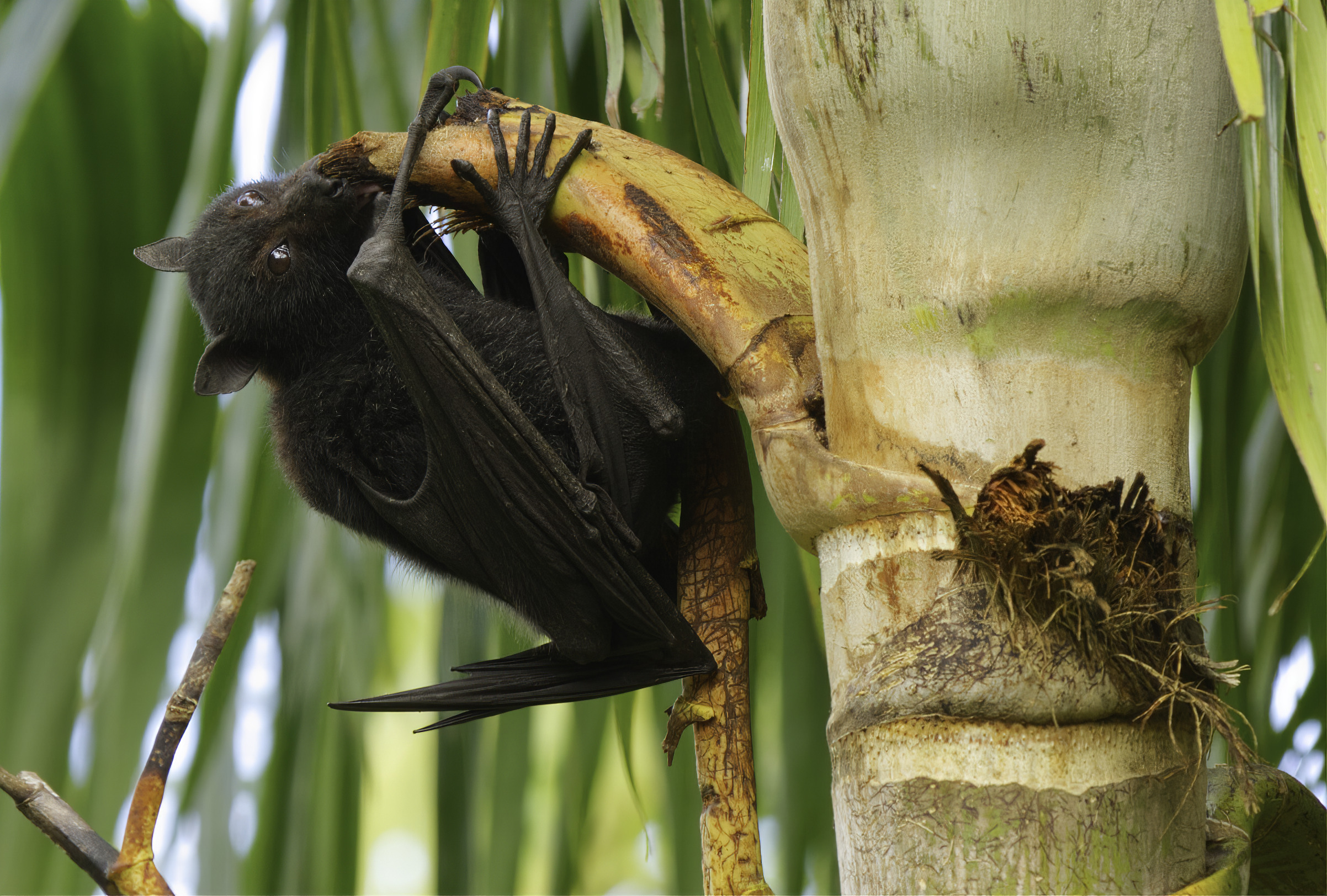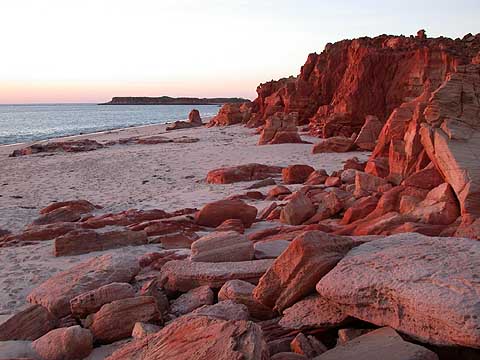|
Broome, Western Australia
Broome, also known as Rubibi by the Yawuru people, is a coastal pearling and tourist town in the Kimberley region of Western Australia, north of Perth. In the the population was recorded as 14,660. It is the largest town in the Kimberley region. Geography Broome is located on Western Australia's tropical Kimberley coast on the eastern edge of the Indian Ocean. Roebuck Bay Being situated on a north–south peninsula, Broome has water on both sides of the town. On the eastern shore are the waters of Roebuck Bay extending from the main jetty at Port Drive to Sandy Point, west of Thangoo station. Town Beach is part of the shoreline and is popular with visitors on the eastern end of the town. It is the site of the 'Staircase to the Moon', where a receding tide and a rising moon combine to create a stunning natural phenomenon. On "Staircase to the Moon" nights, a food and craft market operates on Town Beach. Roebuck Bay is of international importance for the millions of migratin ... [...More Info...] [...Related Items...] OR: [Wikipedia] [Google] [Baidu] |
Kimberley (Western Australia)
The Kimberley is the northernmost of the nine regions of Western Australia. It is bordered on the west by the Indian Ocean, on the north by the Timor Sea, on the south by the Great Sandy Desert, Great Sandy and Tanami Desert, Tanami deserts in the region of the Pilbara, and on the east by the Northern Territory. The region was named in 1879 by government surveyor Alexander Forrest after Secretary of State for the Colonies John Wodehouse, 1st Earl of Kimberley. History The Kimberley was one of the earliest settled parts of Australia, with the first humans landing about 65,000 years ago. They created a complex culture that developed over thousands of years. Yam (vegetable), Yam (''Dioscorea hastifolia'') agriculture was developed, and rock art suggests that this was where some of the earliest boomerangs were invented. The worship of Wandjina deities was most common in this region, and a complex theology dealing with the transmigration of souls was part of the local people's r ... [...More Info...] [...Related Items...] OR: [Wikipedia] [Google] [Baidu] |
Time In Australia
Australia uses three main time zones: Australian Western Standard Time (AWST; UTC+08:00), Australian Central Standard Time (ACST; UTC+09:30), and Australian Eastern Standard Time (AEST; UTC+10:00). Time is regulated by the individual state governments, some of which observe daylight saving time (DST). Australia's external territories observe different time zones. Standard time was introduced in the 1890s when all of the Australian colonies adopted it. Before the switch to standard time zones, each local city or town was free to determine its local time, called local mean time. Now, Western Australia uses Western Standard Time; South Australia and the Northern Territory use Central Standard Time; while New South Wales, Queensland, Tasmania, Victoria, Jervis Bay Territory, and the Australian Capital Territory use Eastern Standard Time. Daylight saving time (+1 hour) is used in jurisdictions in the south and south-east: South Australia, New South Wales, Victoria, Tasmania, Je ... [...More Info...] [...Related Items...] OR: [Wikipedia] [Google] [Baidu] |
Black Flying Fox
The black flying fox or black fruit bat (''Pteropus alecto'') is a bat in the family Pteropodidae. It is among the largest bats in the world, but is considerably smaller than the largest species in its genus, ''Pteropus''. The black flying fox is native to Australia, Papua New Guinea, and Indonesia. It is not a threatened species. Taxonomy Juvenile specimens of this species from Moa Island in Torres Strait have been described as a separate species, ''Pteropus banakrisi''. This supposed species was known as the "Torresian flying fox" or "Moa Island fruit bat". Description The black flying fox has short, black hair with a contrasting reddish-brown mantle, and a mean forearm length of 164 mm (6.46 in) and a mean weight of 710 g (1.57 lb). It is one of the largest bat species in the world, and has a wingspan of more than 1 m. Distribution Black flying foxes are native to Australia (New South Wales, Queensland, Northern Territory and Western Australia), Pa ... [...More Info...] [...Related Items...] OR: [Wikipedia] [Google] [Baidu] |
Governor Of Western Australia
The governor of Western Australia is the representative in Western Australia of the monarch of Australia, currently King Charles III. As with the other governors of the Australian states, the governor of Western Australia performs constitutional, ceremonial and community functions, including: * presiding over the Executive Council of Western Australia, Executive Council; * proroguing and dissolving the Western Australian Legislative Assembly, Legislative Assembly and the Western Australian Legislative Council, Legislative Council; * issuing writs for List of Western Australian Legislative Assembly elections, elections; and * appointing Cabinet minister, Ministers, Judges, Magistrates and Justice of the Peace, Justices of the Peace. Furthermore, all bills passed by the Parliament of Western Australia require the governor's signature before they become acts and pass into law. However, since convention almost always requires the governor to act on the advice of the Premier of Weste ... [...More Info...] [...Related Items...] OR: [Wikipedia] [Google] [Baidu] |
Frederick Broome
Sir Frederick Napier Broome (18 November 1842 – 26 November 1896) was a colonial administrator in the British Empire, serving in Natal, Mauritius, Western Australia, Barbados and Trinidad and Tobago. The Western Australian towns of Broome and Broomehill are named after him. He has signed his name as F. Napier Broome. Early life The eldest son of Rev. Frederick Broome, rector of Kenley, Shropshire, by his wife Catherine Eleanor (eldest daughter of Lieut.-Colonel Napier, formerly Superintendent, Indian Department, Canada) Broome was born in Canada and educated at Whitchurch Grammar School, Shropshire. When visiting England in 1865, he married Mary Anne Barker on 21 June. The couple moved to New Zealand where Broome had a sheep station, in the Malvern Hills, province of Canterbury. Career Journalist and poet Broome returned to London in 1869, and for the following six years was a regular contributor to ''The Times'', being the newspaper's correspondent at the Duke of Edi ... [...More Info...] [...Related Items...] OR: [Wikipedia] [Google] [Baidu] |
John Forrest
Sir John Forrest (22 August 1847 – 2 SeptemberSome sources give the date as 3 September 1918 1918) was an Australian explorer and politician. He was the first premier of Western Australia (1890–1901) and a long-serving cabinet minister in federal politics. Forrest was born in Bunbury, Western Australia, to Scottish immigrant parents. He was the colony's first locally born surveyor, coming to public notice in 1869 when he led an expedition into the interior in search of Ludwig Leichhardt. The following year, Forrest accomplished the first land crossing from Perth to Adelaide across the Nullarbor Plain. His third expedition in 1874 travelled from Geraldton to Adelaide through the centre of Australia. Forrest's expeditions were characterised by a cautious, well-planned approach and diligent record-keeping. He received the Patron's Medal of the Royal Geographical Society in 1876. Forrest became involved in politics through his promotion to surveyor-general, a powerful posi ... [...More Info...] [...Related Items...] OR: [Wikipedia] [Google] [Baidu] |
Roebuck Bay
Roebuck Bay is a bay on the coast of the Kimberley region of Western Australia. Its entrance is bounded in the north by the town of Broome, and in the south by Bush Point and Sandy Point. It is named after , the ship captained by William Dampier when he explored the coast of north-western Australia in 1699. The Broome Bird Observatory lies on the northern coast of the bay. Description Roebuck Bay is a 550 km2 (210 mi2) tropical, marine embayment. It has red sandy beaches and areas of mangroves, with the eastern edge of the bay being made up of linear tidal creeks. It is surrounded by grasslands and pindan woodland.Protecting Ramsar Wetlands. The northern shore of the bay is dominated by a long and low red cliff, 2–6 m in height, of pindan soil which gives the beaches there their distinctive red colouration. It overlies yellowish-red Broome Sandstone of Cretaceous age which, when exposed at the base of the cliff, shows occasional fossil footprints of din ... [...More Info...] [...Related Items...] OR: [Wikipedia] [Google] [Baidu] |
Charles Harper (politician)
Charles Harper (15 July 1842 – 20 April 1912) was a pastoralist, newspaper proprietor and politician in colonial Western Australia. Biography Early life Charles Harper was born on 15 July 1842 at Nardi, near Toodyay in Western Australia. His father was Reverend Charles Harper, a Church of England minister, and his mother, Julia Gretchem Harper ''née'' Lukin. He was educated privately. Pastoral career He took up farming in Beverley, Western Australia. In 1861 and again in 1864, he explored with other pioneers in the Yilgarn district. From 1866, he was heavily involved in the pastoral industry. He was a pastoralist in the north-west of the state until 1868, overlanding to Geraldton in 1867 to secure provisions for Roebourne. From 1868 to 1870, he was involved in the pearling industry. He then briefly farmed at Beverley, before returning to the north west in 1871. He went into partnership with McKenzie Grant and Edgar in a de Grey sheep station, and was involved in t ... [...More Info...] [...Related Items...] OR: [Wikipedia] [Google] [Baidu] |
Dampier Peninsula
The Dampier Peninsula is a peninsula located north of Broome and Roebuck Bay in Western Australia. It is surrounded by the Indian Ocean to the west and north, and King Sound to the east. It is named after the mariner and explorer William Dampier who visited it. The northernmost part of the peninsula is Cape Leveque. It is sparsely inhabited, mostly by Indigenous Australian peoples, some of whom have been granted native title rights to some of their traditional lands. There are many coastal inlets, bays and other features, including Beagle Bay on its western side. Aboriginal heritage The peninsula is home to a rich heritage of Aboriginal culture, with the communities of Beagle Bay, Bobieding, Djarindjin, Ardyaloon (One Arm Point) and Ngardalargin, along with numerous other smaller communities, pearling camps, tourist resorts and Aboriginal outstations. The traditional owners of the areas around the peninsula are the Bardi, Nyunyul and Jabirr Jabirr (Djaberadjabera) peo ... [...More Info...] [...Related Items...] OR: [Wikipedia] [Google] [Baidu] |
William Dampier
William Dampier (baptised 5 September 1651; died March 1715) was an English explorer, pirate, privateer, navigator, and naturalist who became the first Englishman to explore parts of what is today Australia, and the first person to circumnavigate the world three times. He has also been described as Australia's first natural historian, as well as one of the most important British explorers of the period between Francis Drake (16th century) and James Cook (18th century), he "bridged those two eras" with a mix of piratical derring-do of the former and scientific inquiry of the later. His expeditions were among the first to identify and name a number of plants, animals, foods, and cooking techniques for a European audience; being among the first English writers to use words such as avocado, barbecue, and chopsticks. In describing the preparation of avocados, he was the first European to describe the making of guacamole, named the breadfruit plant, and made frequent documenta ... [...More Info...] [...Related Items...] OR: [Wikipedia] [Google] [Baidu] |
Yawuru People
The Yawuru, also spelt Jawuru, are an Indigenous Australian people of the Kimberley region of Western Australia. Language A Japanese linguist, Hosokawa Kōmei (細川弘明), compiled the first basic dictionary of the Yawuru language in 1988, and followed it up with a comprehensive descriptive grammar in 2011. Country Their territory, much of it of open saltmarsh, encompasses the area from the eastern shores of Roebuck Bay south of Roebuck Plains through to the southern end of Thangoo Station and within 5 miles of Cape Villaret. Their inland extension ran close to ''Mandikarakapo'' (Dampier Downs). Norman Tindale's overall estimate of their territory posits a domain of roughly . Their neighbouring tribes were the Jukan to the north, and, running clockwise, the Warrwa northeast, the Nyigina on the eastern hinterland, and on their southern frontier the Karajarri, The border with the latter is marked by an ecological transition from the coastal saltmarsh plains to the den ... [...More Info...] [...Related Items...] OR: [Wikipedia] [Google] [Baidu] |
Cable Beach Sunset Camel Ride
Cable may refer to: Mechanical * Nautical cable, an assembly of three or more ropes woven against the weave of the ropes, rendering it virtually waterproof * Wire rope, a type of rope that consists of several strands of metal wire laid into a helix ** Arresting cable, part of a system used to rapidly decelerate an aircraft as it lands ** Bowden cable, a mechanical cable for transmitting forces * Rope generally, especially a thick, heavy ("cable laid") variety Transmission * Electrical cable, an assembly of one or more wires which may be insulated, used for transmission of electrical power or signals ** Coaxial cable, an electrical cable comprising an inner conductor surrounded by a flexible, tubular insulating layer, coated or surrounded by a tubular conducting shield ** Power cable, a cable used to transmit electrical power ** Submarine communications cable, a cable laid on the sea bed to carry telecommunication signals between land-based stations * Fiber-optic cable, a ca ... [...More Info...] [...Related Items...] OR: [Wikipedia] [Google] [Baidu] |








